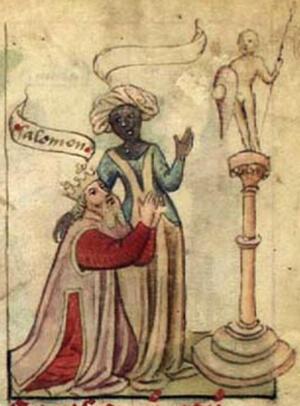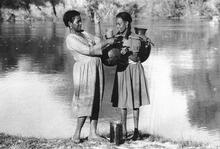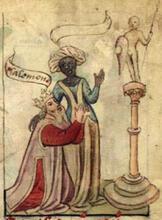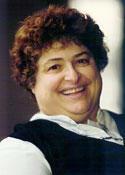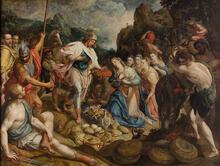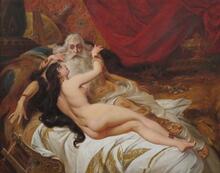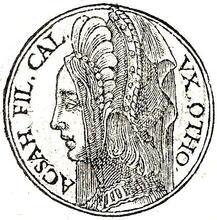Queen of Sheba: Bible
Sheba, despite the mystery of her origins, presents us with a valid memory of women who managed to carve out high-ranking positions for themselves in worlds dominated by men. An independent woman ruling a fabulously wealthy Arabian or African kingdom to the south of Judah, this unnamed queen appears in one of the many stories emphasizing the grandeur of Solomon’s court and his international reputation for extraordinary wisdom. Whether viewed as a dangerous demonic partner or a noble ancestress, traditional sources portray her as an able ruler, and hence, a powerful human incarnation of the virtues and abilities residing in Woman Wisdom of Proverbs 1–9.
An independent woman ruling a fabulously wealthy Arabian or African kingdom to the south of Judah, this unnamed queen appears in one of the many stories emphasizing the grandeur of Solomon’s court and his international reputation for extraordinary wisdom. In the brief notice of her visit, the 1 Kings and 2 Chronicles narratives highlight her wealth and intelligence, as well as Solomon’s. Despite the legendary nature of her story, extrabiblical records from Egypt and Mesopotamia, which amply attest to the presence of strong women rulers of international reputation in Egypt and Arabia both before and after the general time period in which the Hebrew Bible places Sheba (c. tenth century B.C.E.), lend credibility to the biblical account. Although some have attempted to identify Sheba’s visit with the Egyptian queen Hatshepsut’s famed expedition to Punt, the land of incense in the Horn of Africa (catalogued on the walls of the queen’s temple at Deir el-Bahri in Egypt), this connection is far too early to fit within biblical chronology. Nevertheless, connections between the Horn of Africa and the kingdoms of southwest Arabia have been well established by archaeology, so the possibility of Sheba’s African origin is not out of the question. Some later traditions connect Sheba with the “dark and lovely” companion of Solomon in the Song of Solomon.
Significance
While her presence in the Hebrew Bible is due to a desire to show Solomon’s magnificence and knowledge, certain terms in the story have given rise to a rich folkloric tradition about her in Jewish, Islamic, and Christian postbiblical legends. Both the phrases “she came” (1 Kgs 10:1) and “Solomon gave to the queen of Sheba all that she desired” (v. 13a), for example, have led to the suggestion of a sexual relationship between the two, which issued in a son, variously called Menelik (Ethiopian Christian), Rehoboam (Islamic), or Nebuchadnezzar (Jewish). For Christians, she is identified with the queen of the South (Matt 12:42; Luke 11:31) or Candace (Acts 8:27) of Ethiopia, and she typifies the “outsider” female who has more good sense than “insider” men.
The queen of Sheba appears in the Antiquities of Josephus (8.5.5) with the name Nicaulis, a noble philosopher and ruler from Egypt or the Horn of Africa. She also appears in the Qur’an (Sura 27) as a queen who submits to Solomon, the prophet of Allah, and converts to Islam. In Jewish legend, she is identified with Lilith, queen of demons. Although her riddles (“hard questions”) do not appear in the Bible, they are given in subsequent sources and show her vast knowledge of the world, including the history of the ruling families of Judah.
Sheba, despite the mystery of her origins, presents us with a valid memory of women who managed to carve out high-ranking positions for themselves in worlds dominated by men. Her “hutzpah” in “testing”—that is, challenging—God’s chosen king with riddles is in no way out of character for such a monarch. It may be that the Bible’s anxiety over the existence of such women is the reason for the suppression of her riddling tradition. Extrabiblical legends also show her to be a facile user of riddles and other wisdom forms, by which she displays her cunning and statecraft. Whether viewed as a dangerous demonic partner or a noble ancestress, traditional sources portray her as an able ruler, and hence, a powerful human incarnation of the virtues and abilities residing in Woman Wisdom of Proverbs 1–9.
Abbott, Nabia. “Pre-Islamic Arab Queens.” American Journal of Semitic Languages and Literature 58 (1941): 1–22.
Fontaine, Carole R. “More Queenly Proverb Performance: The Queen of Sheba in the Targum Esther Sheni.” In Wisdom, You Are My Sister: Studies in Honor of Roland E. Murphy, O. Carm., on the Occasion of His Eightieth Birthday, edited by Michael L. Barré, 216–233. Washington, D. C.: 1997.
Lassner, Jacob. Demonizing the Queen of Sheba: Boundaries of Gender and Culture in Postbiblical Judaism and Medieval Islam. Chicago: 1993.
Meyers, Carol, General Editor. Women in Scripture. New York: 2000.
Pritchard, James B., ed. Solomon and Sheba. London: 1974.

